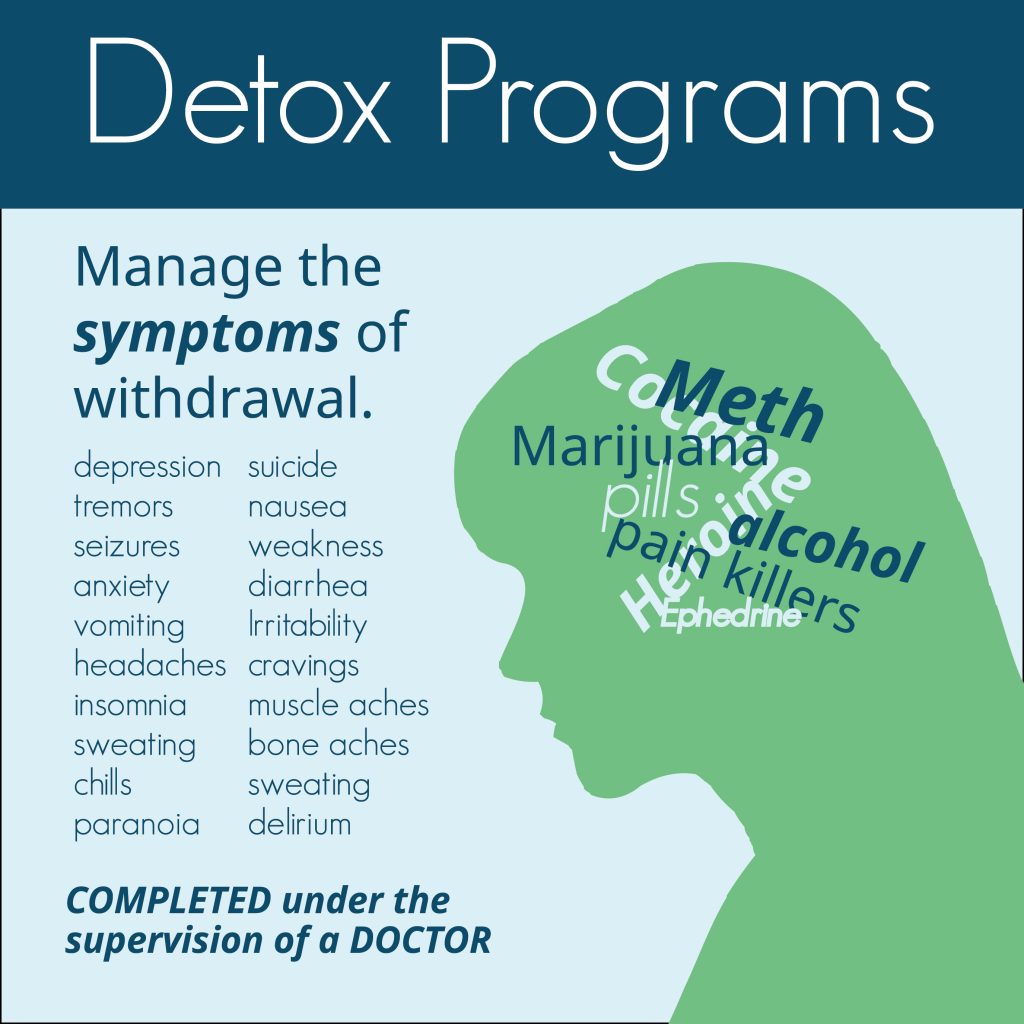Drug and Alcohol Detox Programs
According to the National Institute on Drug Abuse detox is a process used that allows the body to get rid of the withdrawal symptoms associated with drug use. Detox does not rid the body of all toxins that enter it when using drugs or alcohol but merely manages the symptoms of withdrawal. There are some forms of detox that exist that are drug-free, however, the primary form of detox uses various medications to alleviate symptoms.
Why Detox is Needed
Unknown to many streets, prescription drugs, and alcohol abuse can cause moderate to severe withdrawal symptoms to users. Some of these symptoms can be medically dangerous and lead to damaging side effects. After the long term or short term use or abuse of a drug, when the use or abuse is suddenly stopped withdrawal symptoms will occur. Depending on the drug these symptoms will vary but may include:
- Heroin Withdrawal Symptoms – insomnia, muscle aches, bone pain, nausea and vomiting, diarrhea, sweating, and chills.
- Benzodiazepine Withdrawal Symptoms – This includes symptoms such as seizures, extreme depression, anxiety, insomnia, headaches, suicide, muscle aches, chest pain, dizziness, weakness, nausea and vomiting, paranoia, mood swings and many, many more. Examples of primary benzodiazepine drugs include Valium, Xanax, and Ativan as well as much other sleep, mood control, and mind-altering substances.
- Prescription Pain Drug Withdrawal Symptoms – This type of withdrawal is very similar to the withdrawal effects of heroin listed above. The primary prescription pain medications causing these symptoms are OxyContin, Oxycodone, Percocet, and Vicoden. They are also the most commonly abused.
- Withdrawal symptoms – These types of symptoms can last a few days for minor cases and can sometimes span out for an entire month depending on the severity of the addiction and the drugs being used. Some of the hardest drugs to come off of include benzodiazepines, methadone, and Suboxone.
- Amphetamine Withdrawal Symptoms – Often the least severe type of withdrawal users of amphetamines like methamphetamine, cocaine, and prescriptions like Ritalin and Adderall experience symptoms like excessive sleeping and eating, depression, mood swings, paranoia and anxiety.
- Alcohol Withdrawal Symptoms – Unknown to some alcohol produces many withdrawal effects including delirium tremens (uncontrolled shaking), seizures, depression, anxiety, stomach aches, vomiting, restlessness, and headaches. Alcohol detox symptoms can be as severe as illicit drugs and prescription.
- Replacement Drug Withdrawal Symptoms – Drugs used to treat addiction like Methadone and Suboxone carry with them severe side effects when an individual decides to stop using them. Some of these include mood swings, irritability, drug cravings, diarrhea, fever, insomnia, nausea, vomiting, severe muscle and bone aches and sweating.
Types of Detox Facilities
Various methods exist to help someone detoxify from drugs. Drug detox methods are used for those taking most forms of prescriptions as well as illicit drugs. Often when an individual is using prescription pain medications or heroin they are given similar medications in smaller doses to alleviate the physical withdrawal symptoms associated with using these drugs. Some are also given sleep medications and anti-anxiety drugs. However, with some anti-anxiety medications, there can be further withdrawal effects and the detox can take longer. With benzodiazepine detoxification patients are often weaned off these drugs with smaller and smaller doses of them each day until they can stop taking them.
Alcohol detox is often done with anticonvulsant medications such as benzodiazepine drugs to prevent the risk of seizure. Most alcohol detox is done without the use of drugs, however, if there is potential for seizure risk medications and required. Replacement Drug Detox is done through a “wind down” process. This is where lesser and lesser doses of methadone or Suboxone is given to users until they are completely taken off of them. Often detox symptoms exist after this is done but they are less severe or life-threatening after the medical protocol is followed to prevent major side effects.
Drug-Free Detox Alternatives
Drug-free detox is an effective method to get someone completely off of drugs. Often when drugs are used in the detox process they can cause other symptoms and problems for the patient. Those detoxing can also become dependent on these drugs and start abusing them. Often with drug-free detox patients are given vitamin therapy, body processes such as massages or even acupuncture to alleviate symptoms. The most positive thing about drug-free detox is that it does not carry with it dangerous side effects for the patient.
One important note with drug-free detox is that it must not be done for an individual for whom it is medically necessary to use medications to come off of drugs. This would be for individuals who are at risk for seizure or even death if they are not properly taken off of medications.
Detox Programs Can Help
All detoxification is done under the direct supervision of a medical doctor and certified nursing staff to monitor symptoms and ensure that any side effects are handled quickly and properly so that there are no major problems. No matter the drugs being used or alcohol problems being experienced an individual can safely come off of these substances and start on the road to recovery.
Additional Resources From DrugRehab.org:
- How To Detox From Heroin
- What Helps With Benzodiazepine Withdrawal?
- What Helps With Alcohol Withdrawal?
- What Is Post Acute Withdrawal Syndrome (PAWS)
- Is Detox Always Required Before Entering A Drug Rehab
Are you or a loved one suffering from addiction?
Don't wait, get the best treatment options today
Call Now: (833) 473-4227

